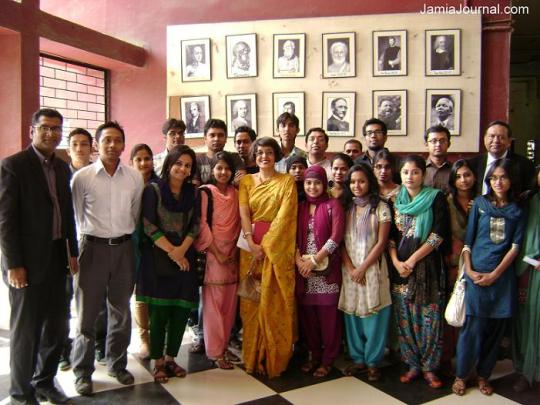[Editor’s Note: Portion of this report subtitled “Interview with the delegates” has been contributed by Khalid Jaleel.]
A seminar on “India, Bangladesh and South Asia” was conducted in the Department of Political Science, on Monday, March 5, 2012, with the participation of a students’ delegation from the University of Dhaka, Bangladesh.

.
The delegation comprised of 22 postgraduate students and two faculty members from the department of international relations, Dhaka University, who are in India as part of a Memorandum of Understanding (MoU) agreed upon by India and Bangladesh to promote people-to-people contact between the two countries.
The programme was kick-started with a welcome address by Prof. Nisar-ul-Haq, Head, Department of Political Science, JMI. The session was chaired by Professor Veena Sikri, former High Commissioner to Bangladesh, and the Chair to the Bangladesh Studies Programme, Academy of International Studies, JMI.
Talking about the purpose of organizing a programme on Indo-Bangladesh ties, Professor Sikri said, “Meeting of minds is what we intend to achieve through today’s gathering and we’re hoping to continue it. Such sessions help in sharing each other’s views and brainstorming on certain important issues.”

Next to speak was Professor Subroto Mukherjee, former Head, Department of Political Science, University of Delhi. While emphasizing the need for cooperation in South Asia, he said, “The destiny of South Asia is to live together. Our geography and culture binds us.”
He added that the Human Development Index of South Asia is very low and poverty is its biggest enemy, but no development could be achieved without cooperation and upholding our values. “There are a lot of common grounds and problems. There’s a need to work out a deal in which both the countries fare better,” he said.
Hoping it would be a meaningful exchange between the young students and asserting her faith in them, Professor Rumki Basu, Department of Political Science, JMI, said, “The future of South Asia lies with you (students). The older generation have tried their own ways of forging links in this region but I do believe that much more could be done by young scholars and students.”
This was followed by a short address by Professor Badrul Alam from the same department who expressed his hope of India and Bangladesh moving on to new areas with increased collaboration.

The introduction to the team from Bangladesh was done by Dr. Ali Ashraf, Assistant Professor, Department of International Relations, University of Dhaka. In his address, he explained the purpose of their tour, and gave information about the University of Dhaka. He also talked about the importance they attach to India and South Asia in their curriculum. “The reason why we’re primarily here is because we want to have a professional seminar so that students can present their papers by interacting with scholars and students of other countries.”
This was followed by paper presentations by Ms. Monzima Haque, Mr. Abid Rabbi Muhammad Mutasim Billah, Mr. Khalillulah and Mr. Mohammad Mohibullah — all students from the University of Dhaka. They spoke respectively on issues of trade, connectivity, border and water disputes between the two countries.
From the department of political science, JMI, Ms. Nihan Hasan gave a brief history of Jamia Millia Islamia, while Mr. Khalid Jaleel and Ms. Manisha Tripathi presented their papers titled, “Bangladesh’s government of 2008 and India’s increasing role in South Asia as a turning point in Indo-Bangladesh relations,” and “Indo-Bangladesh Relations: Mending Fences” respectively.
Commenting on the papers, Prof. Veena Sikri said that it was great to hear the students speaking not only about the problems but the possible solutions too.
After which a healthy question-answer session followed.
The concluding remarks came from Prof. Atique Rehman of the Department of International Relations, University of Dhaka, who said, “This should not be treated as the end, but just a beginning indeed.”
The programme ended with a vote of thanks by Dr. Adnan Farooqui, Assistant Professor, Department of Political Science, JMI.
Interview with the Delegates

Speaking of his experiences since his arrival in India, Mr. Mohammad Mohibullah, a student delegate from Bangladesh said, “My experience has been awesome. First of all, I’ve experienced multiculturalism; I have had contact with many people from many regions of India.” Moreover, he said, “I have come to know the view point of Indians about Bangladesh.”
Mohibullah made a special comment on the hospitality he and his friends have experienced while in India. He said, he is “amazed” at how hospitable people have been to him here. “People are very helpful,” he emphasized.
Ms. Nadia Zabin, another student delegate from Bangladesh said, “My experience has been incredible. No matter what the (Indian) politicians say, or whatever the BSF (Border Security Force) say that we will not stop firing — but your hospitality is sweet.”
“I think people-to-people connectivity, discussions and negotiations,” she said, “will prove fruitful in making this relationship better.”
Both, Mohibullah and Zabin remarked that their trip to India meant a lot to them and will be taking back with them many pleasant memories of their stay in India.
Scenes From the Event:
*click on image to enlarge.
 Jamia Journal Independent Student-run News Website of Jamia Millia Islamia (a Central University)
Jamia Journal Independent Student-run News Website of Jamia Millia Islamia (a Central University)













